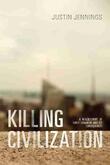Sökning: onr:4kn2t7r628ktgpzh > Killing civilization :
- 1 av 1
- Föregående post
- Nästa post
- Till träfflistan
Killing civilization : a reassessment of early urbanism and its consequences / Justin Jennings.
- Jennings, Justin (författare)
- ISBN 0826362737
- Publicerad: Albuquerque : University of New Mexico Press, 2016
- Engelska xiv, 360 pages
- Bok
Innehållsförteckning
Sammanfattning
Ämnesord
Inställningar
Hjälp
Stäng
- Civilization, or Morgan's Golem -- The Golem's march -- Becoming a city -- Çatalhöyük and the aborted cities of the Neolithic Near East -- Cahokia's failure and the creation of the Mississippian cultural horizon -- Harappa and the walled cities of the Indus river valley -- Jenne-jeno and the clustered cities of the Inland Niger Delta -- Tiahuanaco and the creation of the Andean middle horizon -- Monte Albán and the making of a Zapotec state -- Without civilization.
- The concept of civilization has long been the basis for theories about how socities evolve. This provocative book challenges that concept. The author argues that a "civilization bias" shapes academic explanations of urbanization, colonization, state formation, and cultural horizons. Although theorists have criticized the concept, Jennings argues that we remain beholden to the idea of civilization, holding back our understanding of the development of complex societies. Early cities have traditionally been seen as by-products of social stratification, specialization, and political centralization. Once states formed, cities emerged, and thus the existence of cities is used to mark the arrival of a society into a civilization stage of development typically associated with high art, bureaucracies, writing, and other features. Bundling together a group of characteristics that often, but not always, appear at around the same time has led archaeologists to consider these characteristics as parts of a single civilization package. As a result, scholars make assumptions about how societies should change, shaping interpretations of what happened during transition periods that are often just rapid enough to be difficult to see archaeologically. Jennings argues instead that much of what is considered "civilization" can be better understood as ways to deal with the challenges of rapid settlement aggregation. He suggests that the accumulation of many people in one place demands societal change in order to provide needed resources and allow the individuals in these large groups to get along with each other. The changes that people improvise during the first years of aggregation have long-term ramifications and impact life across great distances. The first states only come centuries later, often replacing the decentralized, less hierarchical regional polities cobbled together as the first cities grow. Killing Civilization employs case studies from across the modern and ancient world to develop a new model of incipient urbanism and its consequences, using excavation and survey data from Çatalhöyük, Cahokia, Harappa, Jenne-jeno, Tiahuanaco, and Monte Albán to create a more accurate picture of the turbulent social, political, and economic conditions in and around the earliest cities. It shows that colonies, cultural horizons, and the creation of the countryside were products of the innovations necessitated by having so many people in one place. The diverse, often ad hoc, arrangements that emerged were often remarkably stable, sustaining the first cities for hundreds of years. Killing Civilization will influence not just anthropology but all the social sciences. -- from dust jacket.
Ämnesord
- Urbanisering (sao)
- Bosättningar (sao)
- Kulturhistoria (sao)
- Cities and towns, Ancient. (LCSH)
- Civilization, Ancient. (LCSH)
- Human settlements. (LCSH)
- Urbanization. (LCSH)
- 15.60 history of continents and countries. (bcl)
- 15.30 archaeology: general. (bcl)
- Cities and towns, Ancient. (fast)
- Civilization, Ancient. (fast)
- Human settlements. (fast)
- Urbanization. (fast)
- Stadt (gnd)
- Zivilisationsprozess (gnd)
- Verstädterung (gnd)
- Siedlung (gnd)
- Human settlements (LCSH)
- Urbanization (LCSH)
- Rural-urban migration (LCSH)
Klassifikation
- HT114 (LCC)
- 307.76093 (DDC)
- Oabba (kssb/8 (machine generated))
Titeln finns på 1 bibliotek.
Bibliotek i södra Sverige (1)
Ange som favorit- Lunds universitets bibliotek, HT-biblioteken, LUX-biblioteket (Humanist- och teologcentrum) (Lux)Ange som favorit
- Titeln i bibliotekets lokala katalog
- Utlånad?Öppettider, adress m.m.
- 1 av 1
- Föregående post
- Nästa post
- Till träfflistan
Kungliga biblioteket hanterar dina personuppgifter i enlighet med EU:s dataskyddsförordning (2018), GDPR. Läs mer om hur det funkar här.
Så här hanterar KB dina uppgifter vid användning av denna tjänst.
Copyright © LIBRIS - Nationella bibliotekssystem

